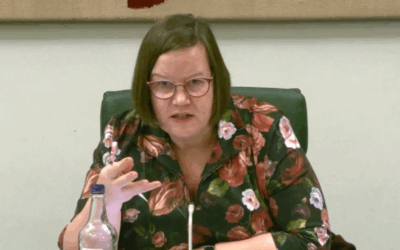Summary: UK ministers last month hailed five of the UK’s Overseas Territories for putting in place searchable registers to reveal who really owns companies in their territory – a key tool against tax evasion, money laundering and other illicit financial activities. TaxWatch set out to see how these registers are working on the ground.
We found that one of the five registers, which ministers told Parliament was “fully public” and had been launched on 30 June, does not yet exist, and there are no plans to make it directly publicly searchable.
In another case we found that fees to access the register have been increased by over eight times from those originally specified in draft legislation. Some registers require requesters to provide documentary evidence that the company whose ownership they are requesting “is linked to money laundering or terrorist financing” (investigations into which are the purpose of the search in the first place).
One territory now allows some access to the ownership register by companies’ prospective business partners, journalists and researchers, but forbids them from disclosing the ownership information to any other person, on pain of a $25,000 fine, potentially making it near-impossible for them to use the information in a meaningful way.
It doesn’t have to be this way: two UK territories (Gibraltar and Montserrat) have put in place fully public, fully searchable beneficial ownership registers. Montserrat’s is entirely free to search.
Meanwhile UK ministers have once again declined to impose any discernable consequences for other UK Overseas Territories that continue to ignore their decade-long agreement to end corporate ownership secrecy on their territories. This is despite the UK Parliament having legislated for ministers to impose such rules on the Overseas Territories directly if they decline to do so independently.
***
Offshore tax evasion relies, in part, on concealing who owns what.
Knowing what assets – generating taxable income or gains – a taxpayer really owns can be difficult to untangle in the best of circumstances, especially if there are multiple layers of ownership via companies, partnerships and trusts in different countries. When there are also legal or informational obstacles to finding out who officially owns a company in those countries, the task may become impossible.
Corporate ownership secrecy is also a key facilitator of money laundering, corruption, terrorist financing and other illicit financial activities: that’s why the UK government says it “pose[s] a direct threat to our national security [and] economic resilience”. And it undermines business and investment, by hiding companies’ real owners and controllers from people might otherwise do business with them, or invest in them, but need to conduct due-diligence first.
Britain’s Overseas Territories – islands and outposts from the Caribbean and the Atlantic to the Mediterranean – are a diverse group of places, but some of them remain amongst the most opaque jurisdictions in the world for keeping secret the real human owners of a company – its ‘beneficial ownership’. The Overseas Territories also include major offshore financial centres, like the British Virgin Islands and Bermuda.
On 31 May, a number of UK Overseas Territories missed a final deadline, agreed with the UK, to introduce registers of company beneficial ownership that would either be publicly searchable, or searchable by ‘legitimate interest’ parties. (Those legitimate interest parties, according to the agreements, would include prospective business partners of the companies, and also journalists and civil society investigators, who have made much of the running over the past decade in exposing who owns and uses secret offshore shell companies through their reporting of the Panama Papers, other offshore leaks, and numerous public interest investigations). This final deadline comes after twelve years of broken agreements and missed deadlines for all the UK Overseas Territories to introduce such registers.
As TaxWatch wrote last month, the only response from the UK government to yet another ignored deadline was a ‘glass half full’ statement by Foreign Office Minister Stephen Doughty on 3 July, repeated by Baroness Chapman in the Lords. They praised ‘progress’ by the Overseas Territories, and hailed new or existing registers in the tiny Saint Helena and Montserrat; and in the more significant offshore centres of Gibraltar, the Cayman Islands, and the Turks and Caicos Islands.
It’s unclear what information from the Overseas Territories the UK Foreign Office used to compile the Ministers’ statement. TaxWatch has sought information directly from those Territories that have – according to the FCDO ministers’ statement – now instituted public or ‘legitimate interest access’ beneficial ownership registers. Here is what we found:
St Helena
3 July ministerial statement: “I welcome the launch of St Helena’s fully public [beneficial ownership] register on 30 June 2025.”
What TaxWatch found: The St Helena beneficial ownership register does not yet exist, and there are no plans to make it directly publicly searchable.
Implementing legislation has been passed, and when TaxWatch contacted the St Helena company registry, they told us that companies had been given a deadline of 30 July to provide details of the beneficial ownership to the company registry, though a number of them have not yet done so.
Even after the ‘register’ is populated with data, it is not directly accessible or searchable by the public. Requesters will instead be required to email a contact point in the company registry with the name of a St Helena company, to ask for its beneficial ownership details. Registry staff will conduct the search and send the results to the requester.
Problematically, however, requesters cannot readily find the names of St Helena companies in public sources to begin with, because the St Helena company register is itself not publicly available. Instead, to find out the existence of a St Helena company in the first place, requesters must similarly email a contact point to ask about information on a given company (whose names are not publicly available) and whether it exists on the St Helena registry.
The St Helena registry cannot say when or if either company information or beneficial ownership information will be made available in a public, searchable format. They told us that “it’s not going to go up where you can go online and search”, though this might be something they will consider “down the road”.
Gibraltar and Montserrat
3 July ministerial statement: “Gibraltar has maintained a fully public register since 2020. I commend their leadership and welcome their efforts to improve user access….Montserrat has also played a leading role by launching its public register in 2024. I welcome their leadership.”
What TaxWatch found: Both territories have online, directly searchable company and beneficial ownership registers. Gibraltar’s beneficial ownership registry costs £2.50 per beneficial ownership search. Montserrat’s (closely modelled on the UK’s Persons of Significant Control register) is free and not behind an account login.
Cayman Islands
3 July ministerial statement: “The Cayman Islands launched their legitimate interest register in February 2025, which allows access by a range of people, including journalists. I welcomed Premier Ebanks’ commitment to make further enhancements in our meeting last month, including more streamlined processes for multiple search requests, including on fees.”
What TaxWatch found: The Cayman Islands register exists and is open to applications for searches from legitimate interest parties (either that they intend to have a business relationship with the company for which information is being sought; or that they are an academic researcher, journalist or civil society organisation for the purposes of “preventing, detecting, investigating, combating or prosecuting money laundering, its predicate offences, or terrorist financing”. It’s yet to be seen how restrictively these criteria will be applied in practice).
However, before the Cayman Islands’ Ministry of Finance Services accepts to search the register, the requester must provide documentary evidence “that the Legal Person subject to the application is linked to money laundering or terrorist financing” in the form of court documents, media articles or similar documentation. This is despite the purpose of the legitimate interest access being precisely to facilitate investigations that would generate such evidence.
Requests for searching the register can only be made by company name: in other words, requesters cannot request a search for companies owned by a particular named individual (as they will be able to do in other jurisdictions, including in theory St Helena). They will therefore somehow have to know that a company (whose ownership is not on public record) is linked to the individual or network that the requester is investigating, before they can ask for ownership information about it.
The Ministry charges search fees of CI 30.00 (USD $36.59) for one company, and CI 100.00 (USD $121.95) for multiple connected companies.
Turks and Caicos Islands
3 July ministerial statement: “The Turks and Caicos Islands launched their legitimate interest register on 30 June, which was very welcome. My understanding is that further enhancements will be made to TCI’s register, and we look forward to working with them to deliver on this.”
What TaxWatch found: The Turks and Caicos Islands’ register exists and is open to applications for searches from legitimate interest parties.
As with the Cayman register, requests for searching the Turks and Caicos beneficial ownership register can only be made for the name of a company, not a named beneficial owner.
Each request for access/information request requires payment of a $250 fee, which is non-refundable even if the requester is denied. This may be prohibitively expensive for many organisations and journalists. Imposing such a high fee appears to be a calculated choice, since the draft Turks & Caicos Islands’ legislation governing such searches, drawn up by the Islands’ government in April, specified fees of only $30 per information request. (TaxWatch has asked the Turks & Caicos’ Attorney-General’s chamber why the fee was increased so much between the draft and final legislation, but has not yet received a response).
An even greater obstacle to the useability of the information is another clause introduced between the draft and final legislation, which forbids an information requester “to disclose the information obtained to any person, unless he is required to do so under any law or for purposes of any legal proceedings”. Doing so carries a $25,000 penalty. Such restrictions have not been imposed by other jurisdictions with ‘legitimate interest’ access to beneficial ownership registers, such as the Cayman Islands. The interpretation of this measure remains to be seen. Taken at face value, it appears to prevent anyone either from publishing the information, despite journalists being one of the categories authorised to request the data; or even from sharing the information with colleagues in their work to combat tax evasion and economic crime. If interpreted strictly, this “we’ll tell you, but you can’t tell anyone else” approach could significantly undermine the usefulness and useability of the beneficial ownership information generated by the register.

Left: draft Turks & Caicos Islands law specifying $30 fee for searching the beneficial ownership register. Right: the $250 fee demanded by the register, as specified in the legislation as finally passed on 30 June.
Glass half empty
Not all of these deficiencies are equally important. St Helena, for instance, is a tiny jurisdiction with only around 200 companies on its corporate registry (though as the history of most offshore financial centres attests, small places may become big places if they start offering significantly more secrecy than elsewhere). Nonetheless it’s a worrying sign that the UK government has so fulsomely praised jurisdictions that at the last minute have put in place additional legal, evidential or cost barriers to accessing or using information about secretly-owned companies; and that it told Parliament that at least one registry existed without, evidently, checking whether it did or not.
(The gap between statement and reality is all the more surprising because the UK Foreign Office (FCDO) told MPs on 10 July that its officials “conducted an in-house assessment of the latest policies and proposals [on beneficial ownership registers] from these Overseas Territories against the discussions at the Joint Ministerial Council in November 2024”. TaxWatch asked the FCDO to comment on our findings, but has not received a reply at the time of writing).
Meanwhile there is no sign of pressure on those UK Overseas Territories that continue to flout their commitments entirely. A more recent Ministerial Statement from Stephen Doughty on 22 July 2025, following yet more video calls with the Overseas Territories’ leaders, indicated that there will still be no immediate or discernable consequences for continuing to ignore their prior agreements. This is despite the fact that the UK parliament has already passed legislation requiring the UK government to draw up an ‘Order in Council’ – UK legislation applying directly in the Overseas Territories – to institute public beneficial ownership registers in hold-out Overseas Territories if they have not done so themselves. The UK government did indeed draw up such an Order in Council in 2020, but said it wouldn’t lay it before Parliament until 2023, to give the Overseas Territories yet more time. That deadline too passed without action. Stephen Doughty’s 22 July statement didn’t mention the now shelved Order in Council, although it reflects the clear will of Parliament; didn’t even name the Overseas Territories which have failed to comply; and simply stressed yet again the importance of “working together”.
It’s also important not to conflate public or researcher access to this information – important though that is – with access by law enforcement and tax authorities. A future post will provide new research on how the UK’s tax authority is able – or not – to use these registries to get under the bonnet of who owns offshore companies and their assets.
***
Main image: Alex Wellerstein/Flickr CC BY-SA 2.0



